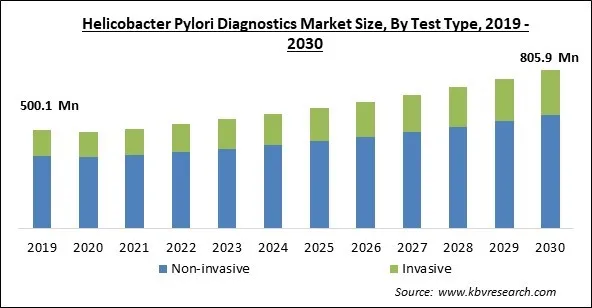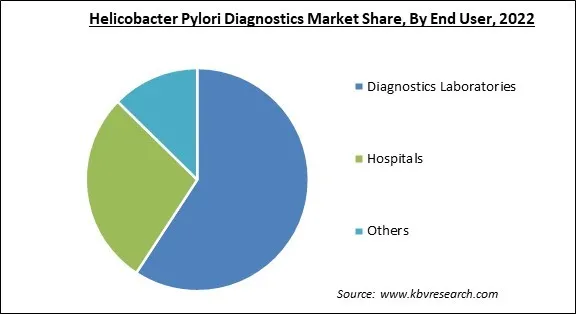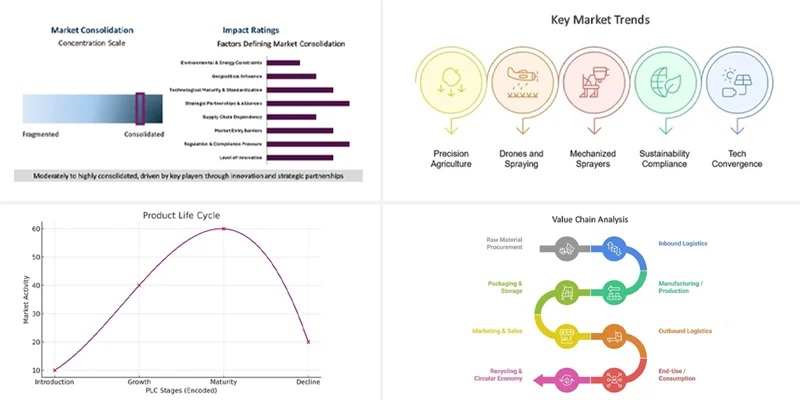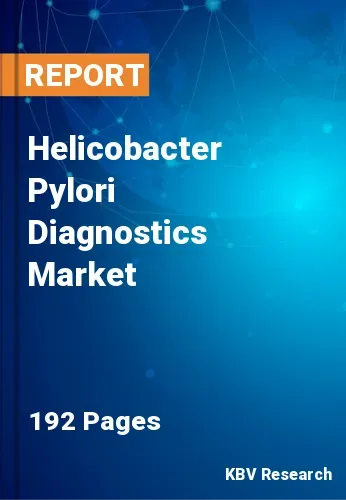The Global Helicobacter Pylori Diagnostics Market size is expected to reach $805.9 Million by 2030, rising at a market growth of 5.5% CAGR during the forecast period.
Diagnostic Laboratories are emerging rapidly due to the rising need for diagnosis of various diseases. Therefore, the diagnostic laboratories segment is expected to generate more than 57% share of the market by 2029. H. pylori infection is responsible for about 89% of all cases of gastric cancer, thus, the need for diagnosis emerges. For example, Gastric cancer will cause 770,000 deaths and 1.1 million new cases worldwide 2020. With variations among nations, male and female incidence rates were, on average, two times higher (15.8 and 7.0 per 100,000, respectively). The highest incidence rates were found in Eastern Asia for both males and females (32.5 and 13.2, respectively); the highest rates were found for males living in Japan (48.1), Mongolia (47.2), and Korea (39.7). With incidence rates of under 5 per 100,000, Africa had the lowest incidence. Some of the factors impacting the market are infectious illness prevalence is increasing, creation of novel and enhanced testing techniques, and limitations of diagnostic methods.

In many nations in 2020, taking a flight across international borders is as commonplace as taking a bus or rail to another city. It is incredibly challenging to stop the spread of many diseases since air travel makes it feasible for someone to fly halfway around the world in less time than it takes for many infections to incubate. As a result, the mentioned reasons are raising the incidence of infectious disorders like helicobacter pylori, raising the demand for diagnosis, and supporting market growth. A biosensor is created to pair a transducer and a bioreceptor, which transforms biological activity into a quantifiable signal. Based on the recognition process, the bio-detection systems are categorized into bio-catalytic or bio-affinity-based systems. The need for these diagnosis techniques will rise due to this advancement in diagnosing helicobacter pylori, driving the market's expansion.
However, some organisms (Brucella and H. pylori) split urea quickly, while others react slowly. Thus, for complete identification, it is recommended that biochemical and serological tests be undertaken on pure culture colonies. Inoculum from a bouillon suspension should not be used to promote growth and the urea hydrolysis reaction. Thus, the limitations associated with various diagnostic methods of helicobacter pylori are expected to hinder market growth.
The pandemic has caused non-urgent diagnostic procedures, such as H. pylori tests, to be delayed or abandoned. As a result, there has been a drop in the demand for H. pylori testing, which has impacted the earnings of businesses involved in this market. However, after the pandemic, the market begin to stabilize and show steady growth for the market. The availability of efficient treatment options for H. pylori infection and the development of novel, reasonably priced diagnostic technologies are credited with this. These factors are anticipated to propel the expansion of the H. pylori diagnostics market in the upcoming years.

Based on test type, the market is segmented into non-invasive test and invasive test. The non-invasive test segment dominated the market with maximum revenue share in 2022. This is due to its many advantages over invasive tests, the advancement of non-invasive testing methods, and the rise in the incidence of stomach ulcers linked to H. pylori gastritis, non-invasive diagnostics have become more and more popular. Some non-invasive diagnostics, referred to as "active tests," can identify an illness that is actively spreading, such as the urea breath test and the stool antigen test. In the primary care context, non-invasive test-and-treat strategies are strongly advised.
On the basis of method, the market is divided into laboratory-based test and point of care test. The laboratory-based test segment witnessed the largest revenue share in the market in 2022. This is owing to their accuracy, usability, and accessibility; laboratory-based tests like the immunoassay have a high adoption rate. To ensure safe shipping, the clinician collects and packages a sample from the patient. This sample is sent to a central lab where a technician will process it. Results from lab tests can typically be generated within 1-2 days, depending on their complexity, and a report is returned to the practitioner.
| Report Attribute | Details |
|---|---|
| Market size value in 2022 | USD 527.8 Million |
| Market size forecast in 2030 | USD 805.9 Million |
| Base Year | 2022 |
| Historical Period | 2019 to 2021 |
| Forecast Period | 2023 to 2030 |
| Revenue Growth Rate | CAGR of 5.5% from 2023 to 2030 |
| Number of Pages | 192 |
| Number of Table | 330 |
| Report coverage | Market Trends, Revenue Estimation and Forecast, Segmentation Analysis, Regional and Country Breakdown, Companies Strategic Developments, Company Profiling |
| Segments covered | Test Type, Method, End User, Region |
| Country scope | US, Canada, Mexico, Germany, UK, France, Russia, Spain, Italy, China, Japan, India, South Korea, Singapore, Malaysia, Brazil, Argentina, UAE, Saudi Arabia, South Africa, Nigeria |
| Growth Drivers |
|
| Restraints |
|
Region-wise, the market is analyzed across North America, Europe, Asia Pacific, and LAMEA. The North America region led the market by generating the maximum revenue share in 2022. This is because the biggest healthcare spending is in North America, which facilitates easier access to diagnostic tests for H pylori testing. A robust healthcare infrastructure, high purchasing power, and increased usage of helicobacter pylori diagnostic tests are anticipated to fuel market expansion. Additionally, the market is boosted by product approvals, acquisitions, and agreements made by the major regional competitors, providing more growth opportunities for the market.
Free Valuable Insights: Global Helicobacter Pylori Diagnostics Market size to reach USD 805.9 Million by 2030
The market research report covers the analysis of key stake holders of the market. Key companies profiled in the report include Cardinal Health, Inc., Biohit Oyj, Abbott Laboratories, Quidel Corporation, Gulf Coast Scientific, Inc. (Gulf Coast Medical Center), Meridian Bioscience, Inc. (SD Biosensor Co., Ltd.), Avanos Medical, Inc., Thermo Fisher Scientific, Inc., Bio-Rad Laboratories, Inc. and F. Hoffmann-La Roche Ltd.
By Test Type
By End User
By Method
By Geography


The Market size is projected to reach USD 805.9 Million by 2030.
Creation of novel and enhanced testing techniques are driving the Market in coming years, however, Limitations of diagnostic methods restraints the growth of the Market.
Cardinal Health, Inc., Biohit Oyj, Abbott Laboratories, Quidel Corporation, Gulf Coast Scientific, Inc. (Gulf Coast Medical Center), Meridian Bioscience, Inc. (SD Biosensor Co., Ltd.), Avanos Medical, Inc., Thermo Fisher Scientific, Inc., Bio-Rad Laboratories, Inc. and F. Hoffmann-La Roche Ltd.
The Diagnostics Laboratories segment is leading the Global Helicobacter Pylori Diagnostics Market by End User in 2022 thereby, achieving a market value of $437.2 Million by 2030.
The North America market dominated the Global Helicobacter Pylori Diagnostics Market by Region in 2022, and would continue to be a dominant market till 2030; thereby, achieving a market value of $300.2 Million by 2030.
Our team of dedicated experts can provide you with attractive expansion opportunities for your business.

